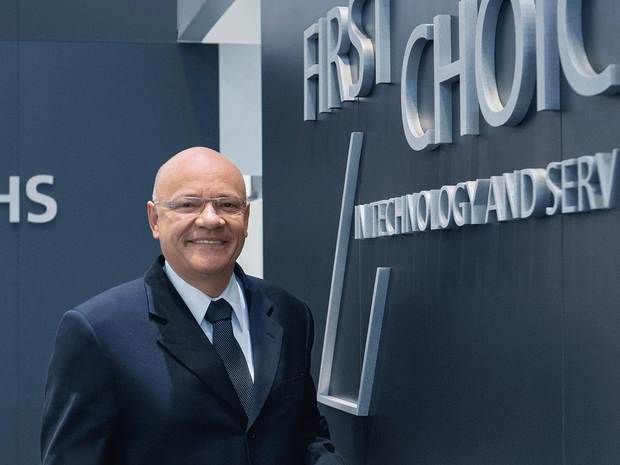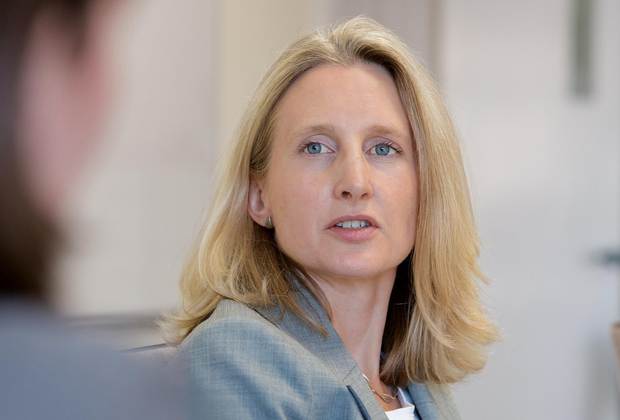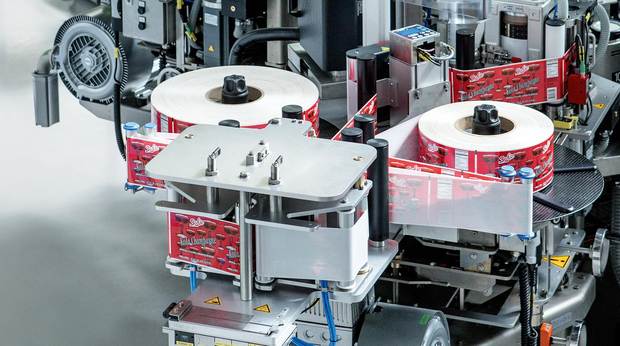KHS’ roots date back to the year 1868 when Louis Holstein and Carl Kappert decided to establish Holstein & Kappert in Dortmund, their core competences being bottle washing and bottle filling. Since then the company has permanently evolved from a German and European manufacturer to an international manufacturer of filling and packaging equipment while retaining a strong presence on its home market. Within Europe, KHS manufactures at five German sites and has established a total of twenty-two sales bases in its Europe/CIS market zone which account for around one third of the KHS turnover worldwide. In the following interview Edgar Petsche, head of Market Zone Europe/CIS, speaks to KHS competence about how the success story of KHS has developed in Europe, why to this day companies in Germany still specifically opt for KHS as their trusted supplier, which trends KHS is observing on the European beverage market and which visions KHS has for the future on this market.
KHS competence: Mr. Petsche, in Europe, KHS’ home market, the company has had an impressive amount of success. What do you think were the key factors behind this?
One of the major steps was the merger of H & K and SEN* to form KHS in 1993. This pooled expertise which was consistently expanded over the next few years by integrating more companies into the KHS Group. This means that we can now act as a turnkey supplier, realizing much of our new machine business – about two thirds, to be precise – with line sales. It’s also very important that we’re represented throughout Europe by our many sales centers. We began in 1962 by setting up our own companies in Switzerland, followed by subsidiaries in the Netherlands, France, Great Britain, Austria, and Scandinavia in the 1970s. After the fall of the Iron Curtain we started establishing sales points in Eastern Europe, primarily in Russia with Moscow. Our most recent offices have been opened in Central Asia and in the Caucasus. We now have a total of twenty-two European branches of KHS, twelve of which are companies in their own right, organized in the three regional centers of Northern Europe, Southern Europe and Eastern Europe. This means we’re excellently positioned and can provide fast local service to our customers. In the near future we’re planning on expanding our activities in both Eastern Europe – especially in Central Asia and the Caucasus – and in Central Europe, concentrating on Scandinavia, Great Britain, and France in particular. Furthermore, at all of our branches our focus will be to establish more service personnel in order to specifically meet our vision of service leadership.

Edgar Petsche,
head of Market Zone Europe/CIS, is a professional salesman through and through. His motto is to “offer each and every customer fully-fledged support – from the initial consultancy session on the required line or machine including commissioning and subsequent maintenance throughout its entire life cycle.”
Petsche, born in Ontario in Canada in 1967, has been interested in mechanical engineering since his schooldays.
He thus chose to major in mechanical engineering at technical senior high school and after studying the same subject he joined the keg technology unit at KHS in 1993. In 1994 Petsche switched to Sales within the company, where he was responsible for North America and the countries of Eastern Europe in particular. In 1997 he was made regional sales manager. From 2006 to 2010 he was head of sales at KHS for Market Zone Africa/Middle East. Petsche has been head of Market Zone Europe/CIS for KHS since 2010.
How does KHS in Europe currently rank among the manufacturers of filling and packaging technology for the beverage sector?
In the past few years we’ve been able to record permanent growth, the greatest being in Central Europe, and are a very firm number two on the European market among our international competitors.
What, in your view, are the main reasons for the industry specifically opting for KHS technology?
This varies from region to region. In Central Europe, for instance, with many companies we’re noticing a trend towards especially innovative yet sustainable line and machine concepts. KHS is in demand here as an innovative, technological leader. The situation in developing countries, such as those in Eastern Europe and Central Asia, is different, though, with the demand primarily for cost-efficient, reliable and easy-to-operate technology. We at KHS do all we can to provide each and every one of our customers with a system tailored to their specific requirements.
This sounds like optimum KHS services are provided right from the start.
They are. We offer our customers a holistic concept which includes detailed consultancy from the quotation phase to the decision to invest, support during commissioning and above all help and support throughout the entire life cycle of the lines and machines. That goes without saying. Clients can choose between a number of different service packages and individual services and thus act as they see fit. If required, KHS can also provide an ’all-inclusive carefree package’ for a customer’s plant engineering.
Is there a growing trend in Europe towards all-inclusive service packages?
Definitely. Service is becoming more and more important. Intelligent concepts are in particular demand in order to ensure the greatest possible availability of lines and machines while keeping an eye on the overall cost. In the end, all-inclusive service packages encourage a higher output, more sustainable production, lower unit costs, and a greater competitive edge. In the last three to four years, we’ve been able to clock up annual sales growth percentages which run into double figures for service alone.
Does KHS count as many small companies as big concerns among its customers in Europe?
All of the global players in the beverage sector who are active in Europe are also part of the KHS customer base. As are many small and medium-sized enterprises. Companies often grow through the years and decades together with KHS technology. One example of this is Obolon Brewery in Ukraine. In 1993 they produced around 0.5 million hectoliters of beer. Now the company sells over ten million hectoliters a year. Up to the present day Obolon is practically producing on KHS technology alone. Over the years KHS has delivered four glass lines, six PET lines, two can lines, two keg lines, and three filter systems to the brewery, plus a fully automatic syrup room. Another example is Bavaria Brewery in the Netherlands, whose yearly sales figure has now reached the around six million hectoliter mark. This family-owned business has relied on KHS since the end of the 1980s and now has ten KHS packaging machines and many other single KHS machines, such as bulk depalletizers and pasteurizers. Only recently it also invested in two turnkey canning lines. This loyalty is undoubtedly not just down to our high-quality technical systems but also to our expertise in consultancy and service.
“All of the global players in the beverage sector who are active in Europe are also part of the KHS customer base. We offer specifically tailored systems to both these customers and to small and medium-sized enterprises, too.”
KHS’ success sounds almost too good to be true. Hasn’t there been the odd critical project or situation with one customer or another in the past?
Of course. We’re often faced with challenges, especially when it comes to our expertise in problem solving. Take Unicer, for instance. Unicer is the biggest beverage company in Portugal in terms of sales and turnover. The company recently decided to centralize all of its brewing activities to one site and close another. The drive to modernize the plant, boost efficiency, and enlarge the site included the procurement of new filling and packaging technology. The brief was that it should only take 15 months from the planning to the commissioning of the new lines and machines. Considering that the scope of delivery encompassed two turnkey glass lines, three fillers, three keg washing and racking systems, and a pasteurizer, this was a very tight timeframe. The single machines had to be perfectly integrated into existing lines in a very short space of time. With regard to the turnkey lines, Unicer’s existing lines had to be dismantled on schedule and the new lines also installed and commissioned within the agreed time after reworking all the floors, connections and the like. We were able to keep to the tight timeline – but only because of the excellent teamwork between Unicer and KHS, which I see as a basic requirement for any project that is to go well. The same applies to the most recent project for Holsten Brewery, a turnkey glass line. Here, we only had eighteen days’ time between the last bottle coming off the old line to the first bottle rolling off the new one. This deadline had to be strictly adhered to so as to ensure the brewery’s ability to supply. We managed it! I don’t think this would’ve been possible without the very good advance planning and the unconditional cooperation of the KHS and Holsten teams.
With such critical projects it’s very important to run through all eventualities in advance. As a rule I believe that sound, thorough preparation is what guarantees a project’s ultimate success. Of course we can’t deny that this is a real-life situation – as in everything we do – and that things can occasionally go wrong. For example, a machine delivery could be delayed due to problems in final assembly or a missing bought-in part. If this happens, it’s important to be completely frank with the customer and talk to him to come up with a joint solution.
You just mentioned KHS’ problem-solving expertise for glass lines. Isn’t KHS just as strong when it comes to turnkey PET lines?
Since integrating KHS Corpoplast and KHS Plasmax into the KHS Group we’ve been able to offer a holistic concept in this field. And this doesn’t just include all of the technology but also a wealth of advice on PET bottle design as part of our Bottles & Shapes concept. With KHS Plasmax we also offer a barrier coating system which provides especially high-quality protection for bottled beverages over a particularly long period of time. Our customers are appreciating our PET line expertise more and more, which is why our PET line sales are growing from year to year. In 2013, for example, we were able to record a two-figure growth in percent for our PET systems compared to the previous year. We consider one of the greatest successes to be that last year Coca-Cola Enterprises invested in a state-of-the-art KHS PET line which is now up and running in Clamart in France to their utmost satisfaction. In 2013 the Carlsberg Group also opted for no fewer than three PET lines, for instance. And German mineral water bottling plants like Brandenburger Urstromquelle also ordered KHS PET line technology in 2013.
Do you think KHS is just as well positioned for canning lines?
Thanks to its history KHS has a very high market share in this area and is often seen by canners to be a technological trendsetter. Most recently, for example, orders for canning lines have been placed by Poland’s Kastellan Brewery (Carlsberg), Unibrew Brewery in Denmark and the Spanish brewery Hijos de Rivera.
As head of Market Zone Europe/CIS you have a good idea of what’s going on the industry. What other trends can you see emerging on the European beverage market?
Throughout Europe there’s a clear trend towards product and format diversity in all beverage segments. At the same time regional products are proving ever more successful alongside their global counterparts. As a result, regional companies are growing in strength alongside the global players. One example of the trend towards regional products is the emergence of an increasing number of new microbreweries, both in Eastern and Western Europe. A development which started with the craft breweries in the USA is now spreading to Europe.
“Companies often grow through the years and decades together with KHS technology.”
Which categories of beverage do you think have an especially good chance of growth in Europe in the future?
There’s a tendency among consumers towards healthier products. This particularly favors products such as water and other non-alcoholic beverages without preservatives and with little to no added sugar. While Western Europe has been turning towards healthy beverages for some time now, health-conscious drinking habits have just started to take hold in Eastern Europe. KHS will profit from this development thanks to an expected higher future demand for aseptic and ultraclean concepts.
And what about the development of the various container types?
In the non-alcoholic beverage segment the global trend is moving away from cartons and glass and more towards PET. As far as beer’s concerned, in the future PET bottles will also be in demand on the Eastern European market and in Russia in particular. In Western Europe I’m seeing a more reserved approach to the PET beer bottle. Here, the glass bottle will remain the container of choice, as in the wine, sparkling wine, and spirits segment.
Based on the trends you’ve just mentioned, how do you see KHS’ future in the Europe/CIS market zone?
Over the past few years we’ve continuously increased our share of the market and would like to remain the supplier of choice for our customers and fulfill the task of innovation and service leadership we’ve set ourselves. In doing so, concepts such as tradition, partnership, reliability and excellence in execution will always hold great importance. Regarding containers, we want to step up our PET system business in particular. Within the industry as a whole we still see plenty of future potential in the wine, sparkling wine, and spirits sector and, concerning our aseptic systems and ESL technology, for milk beverages as well as the other traditional sensitive products.
Mr. Petsche, thank you very much for this interview.
The interview was conducted by Friederike Arndt.























